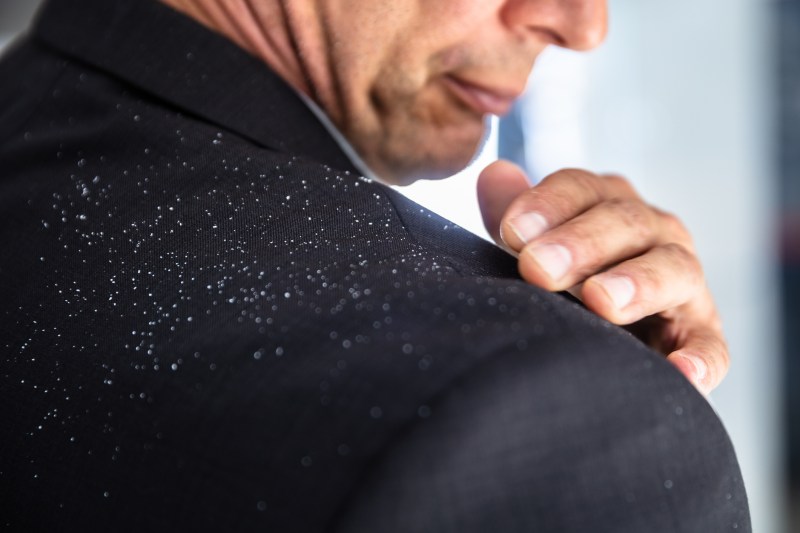
Anyone who has ever experienced dandruff knows an itchy scalp is as painful as it is embarrassing. An estimated 50% of the population worldwide has dealt with the skin condition — and yes, the majority of those affected are men.
Fortunately, dandruff is simple to eliminate. It is worth noting those with extreme cases you should consider speaking with a dermatologist, but most will discover the products below will offer speedy treatment. Here are a couple of preventative measures you can add to your grooming routine, followed by a list of trusted remedies on how to get rid of dandruff once and for all.

What causes dandruff?
Understanding the different dandruff causes helps to find an effective solution to your problem. The common causes include allergic reactions, eczema, dry skin, psoriasis, oily skin, fungus sensitivity, and inadequate shampooing. Note that these factors can also cause beard dandruff so finding the right shampoo is important for your hair and beard.
In most cases, a single-celled microbe known as Malassezia is the most common cause of dandruff, as revealed in a 2014 study. It exists in everyone’s scalp, and it breaks down oils into oleic acid, which causes dandruff. Several factors also increase the risk of dandruff, including choice of hair products, medical conditions, stress levels, and a person’s age.
Once it invades your scalp, dandruff causes the skin to flake. If ignored, it can be quite stubborn to treat. So, it’s best to stage a battle against dandruff flakes early and save your scalp from the endless experience of dandruff vs. dry scalp, itching, and scratching.

Our top tips to on how to get rid of dandruff
Keep reading and find out the best ways to get rid of dandruff. some remedies may be obvious and some may be new ways for you to try.
Cleanse your hair weekly
One way of dealing with this unpleasant condition is by giving your hair a once-a-week rinse. Don’t underestimate how important it is to take care of your scalp. Check for irritation and begin treating with an exfoliant for your scalp.
Use anti-dandruff shampoo
Dandruff shampoo offers one of the most effective ways of controlling flaking and itching on your scalp. Shampoos come with varying ingredients and in different formulations, so it’s worth reading the label. If you’re on the hunt for a dandruff-treating shampoo, here are some options:

Coal tar shampoo: MG217 Psoriasis 3% Coal Tar
This shampoo treats dandruff by minimizing flaking of the scalp. However, it can discolor blonde hair — best suited for darker hair.

Salicylic acid shampoo: Kenkoderm Psoriasis 3% Salicylic Acid
This shampoo from Kenkoderm contains salicylic acid which is proven to prevent the buildup of dandruff as well as relieve scalp itch. The formula continues to work even after you’ve washed it off your hair.
Ketoconazole
When all other options fail, this antifungal shampoo makes a great option. It’s costly, though!

Selenium sulfide shampoo: Selsun Blue Moisturizing with Aloe Dandruff
This shampoo also slows flaking, and it’s also ideal for Malassezia-caused dandruff. However, it can discolor light hair.
If you’re uncertain about the right shampoo, it’s advisable to consult a dermatologist first. Ketoconazole and selenium sulfide-based shampoos tend to cost more than other options. Typically, the prices range from $3 to $60.
Check your hair products
Some men tend to suffer from dandruff due to their everyday hair products, including shampoo, conditioner, gel, pomade, dry shampoo, and more. If you have a recent dandruff problem, try switching your hair products and care routine before rushing to the dermatologist. Some of the products have ingredients and chemicals that worsen dandruff. Examples of such components include sulfates, parabens, silicone, sodium chloride, and formaldehyde.
These ingredients worsen dandruff by causing skin irritation, dehydrating the skin, clogging skin pores, and stripping the hair of essential natural oils. So, it’s definitely worth paying attention to skincare product ingredients whenever you’re shopping. Otherwise, severe cases might require medical intervention.

Try a home remedy
You can use home remedies and products, such as apple cider vinegar, white vinegar, and lemon juice, to create a potent solution for cleansing your hair.
Green tea, peppermint oil, and white vinegar
It’s best to give your hair a deep rinse after shampooing and conditioning, and this can help with shine, smoothness, and a healthier scalp. For example, you can create a rinse solution using:
- 1 cup of freshly brewed green tea — not hot!
- 2 to 3 drops of peppermint oil
- 1 teaspoon of white vinegar
Carefully mix these ingredients to create the solution, which is useful for cleansing your scalp and hair. Massage it into the scalp for 3 to 5 minutes, and then wash your hair thoroughly with fresh water. For the best results, be sure to cleanse your hair weekly.
Peppermint oil and green tea contain antimicrobial agents and antioxidants that fight harmful bacteria and replenish the scalp, while white vinegar promotes healthy oils in the scalp to prevent dry skin. Apple cider vinegar soothes the scalp and washes away dead skin cells.
Baking soda
For another DIY remedy for dandruff, try using baking soda. Bear in mind that only anecdotal reports show that baking soda is ideal for dandruff treatment — no research supports its use yet. Proponents of the idea claim that baking soda’s antifungal properties make it suitable for treating dandruff.
You can add a tablespoon of baking soda to your typical shampoo or mix it with water to create a paste. Apply the mixture to your scalp while gently scrubbing it, and then rinse thoroughly with water after 3 minutes. However, baking soda has a high pH value of 9, so it’s not ideal for regular use.
Apple cider vinegar
Vinegar also makes an ideal natural remedy for dandruff, thanks to its antioxidant and antimicrobial properties. The MedicalNewsToday notes that it might help control different scalp conditions, such as persistent itching, skin flaking, and dandruff.
Apple cider vinegar contains acetic acid, making it a weak acidic solution that reduces the scalp’s pH level, thus minimizing dandruff symptoms. Mix 1 to 3 tablespoons of apple cider vinegar with warm water and wash your head using the solution. Massage the solution into the scalp and allow it to sit for several minutes before rinsing your head.
Aloe vera
Aloe vera is commonly used to treat minor wounds and burns. This succulent plant has spiky leaves, which contain its “magical” gel. The gel is packed with amino acids, minerals, vitamins, and other vital components that nourish the skin, as explained by Healthline.
A 2008 study revealed that the aloe vera gel moisturizes a dry scalp, reduces skin irritation, minimizes inflammation, and prevents cell damage. While it might not be effective for severe dandruff, the gel can provide relief in mild cases. Simply extract it from the leaves and apply it to your head. Let it sit for 30 minutes before rinsing it off with water and mild shampoo.
Tea tree oil
Research has shown that tea tree oil may be useful in treating dandruff because of its antifungal properties. In fact, it’s even an ingredient in some anti-dandruff shampoo products. So, it might be an ideal option for men looking for how to get rid of dandruff fast and naturally.
It works by reducing yeast overgrowth on the scalp and relieving itching. A 2006 study found that a shampoo with tea tree oil offered positive results. You can either buy a

Tips on how to avoid getting dandruff in the first place
Here are some non-scalp-related tips on how to avoid getting dandruff worth giving a try.
Diet
Some people find that their dandruff improves when they eat a healthy diet rich in omega-3 fatty acids, zinc, and B vitamins. Consider incorporating oily fish, nuts, seeds, and whole grains into your diet.
Avoid stress
Stress can worsen dandruff symptoms. Try relaxation techniques like yoga or meditation to manage stress levels.
Medical conditions
In some cases, dandruff can be a symptom of an underlying medical condition, such as seborrheic dermatitis or psoriasis. If your dandruff is severe or doesn’t improve with home care, consult a doctor or dermatologist.




